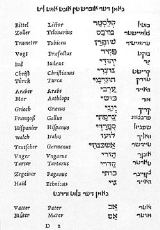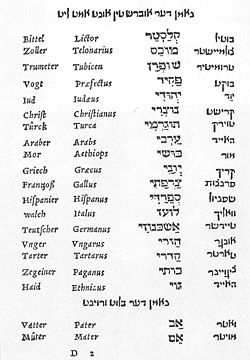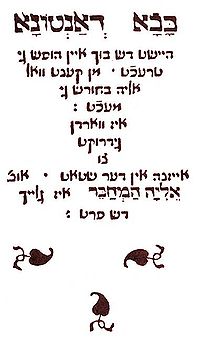
Elia Levita
Encyclopedia

Renaissance
The Renaissance was a cultural movement that spanned roughly the 14th to the 17th century, beginning in Italy in the Late Middle Ages and later spreading to the rest of Europe. The term is also used more loosely to refer to the historical era, but since the changes of the Renaissance were not...
Hebrew grammarian, scholar and poet. He was influential in helping to create the Yiddish language
Yiddish language
Yiddish is a High German language of Ashkenazi Jewish origin, spoken throughout the world. It developed as a fusion of German dialects with Hebrew, Aramaic, Slavic languages and traces of Romance languages...
. He was the author of the Bovo-Bukh
Bovo-Bukh
The Bovo-Bukh , written in 1507–1508 by Elia Levita, was the most popular chivalric romance in the Yiddish language. It was first printed in 1541, being the first non-religious book to be printed in Yiddish. For five centuries, it endured at least 40 editions...
(written in 1507–1508), the most popular chivalric
Chivalry
Chivalry is a term related to the medieval institution of knighthood which has an aristocratic military origin of individual training and service to others. Chivalry was also the term used to refer to a group of mounted men-at-arms as well as to martial valour...
romance
Romance (genre)
As a literary genre of high culture, romance or chivalric romance is a style of heroic prose and verse narrative that was popular in the aristocratic circles of High Medieval and Early Modern Europe. They were fantastic stories about marvel-filled adventures, often of a knight errant portrayed as...
written in Yiddish, which, according to Sol Liptzin
Sol Liptzin
Sol Liptzin was a scholar, author, and educator in Yiddish and German literature.- Life :Liptzin was born in Sataniv, Ukraine, and moved to New York at the age of nine. He graduated from City College of New York and did postgraduate work at the University of Berlin. He earned a master's degree and...
, is "generally regarded as the most outstanding poetic work in Old Yiddish". Living for a decade in the house of Cardinal Aegidius of Viterbo
Aegidius of Viterbo
Aegidius Antonini of Viterbo was an Italian Augustinian cardinal, a reforming theologian, orator, humanist and poet. He was born at Viterbo, Italy and died at Rome.-Life:...
, he was also one of the foremost tutors of Christian notables in Hebrew and Jewish mysticism during the Renaissance.
Born at Neustadt
Neustadt an der Aisch
Neustadt an der Aisch is a small town in the northern part of Bavaria , within the Franconian administrative region Middle Franconia,...
near Nuremberg
Nuremberg
Nuremberg[p] is a city in the German state of Bavaria, in the administrative region of Middle Franconia. Situated on the Pegnitz river and the Rhine–Main–Danube Canal, it is located about north of Munich and is Franconia's largest city. The population is 505,664...
, to a family of Levitical status
Levite
In Jewish tradition, a Levite is a member of the Hebrew tribe of Levi. When Joshua led the Israelites into the land of Canaan, the Levites were the only Israelite tribe that received cities but were not allowed to be landowners "because the Lord the God of Israel himself is their inheritance"...
, he was the youngest of nine brothers. During his early manhood, the Jews were expelled from this area. He lived in Venice
Venice
Venice is a city in northern Italy which is renowned for the beauty of its setting, its architecture and its artworks. It is the capital of the Veneto region...
for a time after 1496, where he was one of the most important figures of the flourishing of Yiddish literature, before the descendants of the Ashkenazic Jews who had emigrated this area adopted the local Italian
Italian language
Italian is a Romance language spoken mainly in Europe: Italy, Switzerland, San Marino, Vatican City, by minorities in Malta, Monaco, Croatia, Slovenia, France, Libya, Eritrea, and Somalia, and by immigrant communities in the Americas and Australia...
speech. During these early years, Levita earned a living as reciter of verse. After Venice, he relocated to Padua
Padua
Padua is a city and comune in the Veneto, northern Italy. It is the capital of the province of Padua and the economic and communications hub of the area. Padua's population is 212,500 . The city is sometimes included, with Venice and Treviso, in the Padua-Treviso-Venice Metropolitan Area, having...
(1504), where he wrote the 650 ottava rima
Ottava rima
Ottava rima is a rhyming stanza form of Italian origin. Originally used for long poems on heroic themes, it later came to be popular in the writing of mock-heroic works. Its earliest known use is in the writings of Giovanni Boccaccio....
stanzas of the Bovo-Bukh, based on the popular romance Buovo d'Antona, which, in turn, was based on the Anglo-Norman
Anglo-Norman
The Anglo-Normans were mainly the descendants of the Normans who ruled England following the Norman conquest by William the Conqueror in 1066. A small number of Normans were already settled in England prior to the conquest...
romance of Sir Bevis of Hampton
Bevis of Hampton
Bevis of Hampton is a legendary English hero and the subject of Anglo-Norman, French, English, Venetian and other medieval metrical romances that bear his name...
.
Escaping a war, he left in 1509 for Rome, where he acquired a friend and patron, the Renaissance humanist Petrus Egidius (1471–1532) of Viterbo
Viterbo
See also Viterbo, Texas and Viterbo UniversityViterbo is an ancient city and comune in the Lazio region of central Italy, the capital of the province of Viterbo. It is approximately 80 driving / 80 walking kilometers north of GRA on the Via Cassia, and it is surrounded by the Monti Cimini and...
, a cardinal
Cardinal (Catholicism)
A cardinal is a senior ecclesiastical official, usually an ordained bishop, and ecclesiastical prince of the Catholic Church. They are collectively known as the College of Cardinals, which as a body elects a new pope. The duties of the cardinals include attending the meetings of the College and...
of Rome. When the turmoil of war drove Levita from Padua to Rome, he was welcomed at the house of Aegidius, where, with the cardinal's family, he lived for more than ten years. Levita taught Hebrew
Hebrew language
Hebrew is a Semitic language of the Afroasiatic language family. Culturally, is it considered by Jews and other religious groups as the language of the Jewish people, though other Jewish languages had originated among diaspora Jews, and the Hebrew language is also used by non-Jewish groups, such...
to Petrus, and copied Hebrew manuscripts—mostly related to the Kabbalah
Kabbalah
Kabbalah/Kabala is a discipline and school of thought concerned with the esoteric aspect of Rabbinic Judaism. It was systematized in 11th-13th century Hachmei Provence and Spain, and again after the Expulsion from Spain, in 16th century Ottoman Palestine...
—for Petrus's library. The first edition of Levita's Baḥur (Rome, 1518) is dedicated to Petrus. Petrus introduced Levita to classical scholarship and the Greek language, thus enabling him to utilize Greek in his Hebrew lexicographic labors — a debt acknowledged by Levita, who, in 1521, dedicated his Concordance to the cardinal.
The 1527 Sack of Rome
Sack of Rome (1527)
The Sack of Rome on 6 May 1527 was a military event carried out by the mutinous troops of Charles V, Holy Roman Emperor in Rome, then part of the Papal States...
sent Levita back to Venice, where he worked as a proofreader and taught Hebrew. Levita published at Venice a treatise on the laws of cantillation
Cantillation
Cantillation is the ritual chanting of readings from the Hebrew Bible in synagogue services. The chants are written and notated in accordance with the special signs or marks printed in the Masoretic text of the Hebrew Bible to complement the letters and vowel points...
entitled Sefer Tuv Ta'am. At seventy years of age, Levita left his wife and children and departed in 1540 for Isny, accepting the invitation of Paul Fagius
Paul Fagius
Paul Fagius was a Renaissance scholar of Biblical Hebrew.-Life:Fagius was born at Rheinzabern in 1504. His father was a teacher and council clerk. In 1515 he went to study at the University of Heidelberg and in 1518 was present at the Heidelberg Disputation...
to superintend his Hebrew printing-press there. During Elia's stay with Fagius (until 1542 at Isny and from 1542 to 1544 at Konstanz
Konstanz
Konstanz is a university city with approximately 80,000 inhabitants located at the western end of Lake Constance in the south-west corner of Germany, bordering Switzerland. The city houses the University of Konstanz.-Location:...
) he published the following works: Tishbi, a dictionary containing 712 words used in Talmud
Talmud
The Talmud is a central text of mainstream Judaism. It takes the form of a record of rabbinic discussions pertaining to Jewish law, ethics, philosophy, customs and history....
and Midrash
Midrash
The Hebrew term Midrash is a homiletic method of biblical exegesis. The term also refers to the whole compilation of homiletic teachings on the Bible....
, with explanations in German and a Latin translation by Fagius (Isny, 1541); Sefer Meturgeman, explaining all the Aramaic words found in the Targum
Targum
Taekwondo is a Korean martial art and the national sport of South Korea. In Korean, tae means "to strike or break with foot"; kwon means "to strike or break with fist"; and do means "way", "method", or "path"...
(Isny, 1541); Shemot Debarim, an alphabetical list of the technical Hebrew words (Isny, 1542); a Judæo-German (that is, early Western Yiddish) version of the Pentateuch, the Five Megillot, and Haftarot (Konstanz, 1544); and a new and revised edition of the Bachur. While in Germany he also printed the first edition of his Bovo-Bukh. On returning to Venice, Eliah, in spite of his great age, he worked on editions of several works, including David Kimhi
David Kimhi
David Kimhi , also known by the Hebrew acronym as the RaDaK , was a medieval rabbi, biblical commentator, philosopher, and grammarian. Born in Narbonne, Provence, he was the son of Rabbi Joseph Kimhi and the brother of Rabbi Moses Kimhi, both biblical commentators and grammarians...
's Miklol, which he also annotated.

Venice
Venice is a city in northern Italy which is renowned for the beauty of its setting, its architecture and its artworks. It is the capital of the Veneto region...
, aged 80 years. He has descendants living today, including British
United Kingdom
The United Kingdom of Great Britain and Northern IrelandIn the United Kingdom and Dependencies, other languages have been officially recognised as legitimate autochthonous languages under the European Charter for Regional or Minority Languages...
Prime Minister
Prime Minister of the United Kingdom
The Prime Minister of the United Kingdom of Great Britain and Northern Ireland is the Head of Her Majesty's Government in the United Kingdom. The Prime Minister and Cabinet are collectively accountable for their policies and actions to the Sovereign, to Parliament, to their political party and...
David Cameron
David Cameron
David William Donald Cameron is the current Prime Minister of the United Kingdom, First Lord of the Treasury, Minister for the Civil Service and Leader of the Conservative Party. Cameron represents Witney as its Member of Parliament ....
.
Liptzin writes that Paris and Vienna, attributed to Levita, "easily ranks with the Bovo-Bukh in quality though not in popularity. Also a chivalric verse romance, it tells the story of a knight (Paris) and a princess (Vienna); the name of the work has no apparent connection to the similarly named cities. He adds that Levita "was not the equal" of his contemporaries Ariosto or Tasso
Tasso
-People:*Torquato Tasso, the famous Italian 16th-century poet, author of Gerusalemme liberata**Tasso, Lament and Triumph, a symphonic poem by Franz Liszt based on the poet*Bernardo Tasso, his father, also a poet...
, and that the "knightly adventures" he depicted "had no basis in Jewish reality": compared to other chivalric romances, Levita's works "tone down the Christian
Christian
A Christian is a person who adheres to Christianity, an Abrahamic, monotheistic religion based on the life and teachings of Jesus of Nazareth as recorded in the Canonical gospels and the letters of the New Testament...
symbols of his original" and "substitute Jewish customs, Jewish values and Jewish traits of character here and there..."
His grandson became a Jesuit priest.
Works
- Elia Levita Bachur's Bovo-Buch: A Translation of the Old Yiddish Edition of 1541 with Introduction and Notes by Elia Levita Bachur, translated and notes by Jerry C. Smith, Fenestra Books, 2003, ISBN 1-58736-160-4.
- Paris and Vienna (attributed)
- miscellaneous shorter poems

